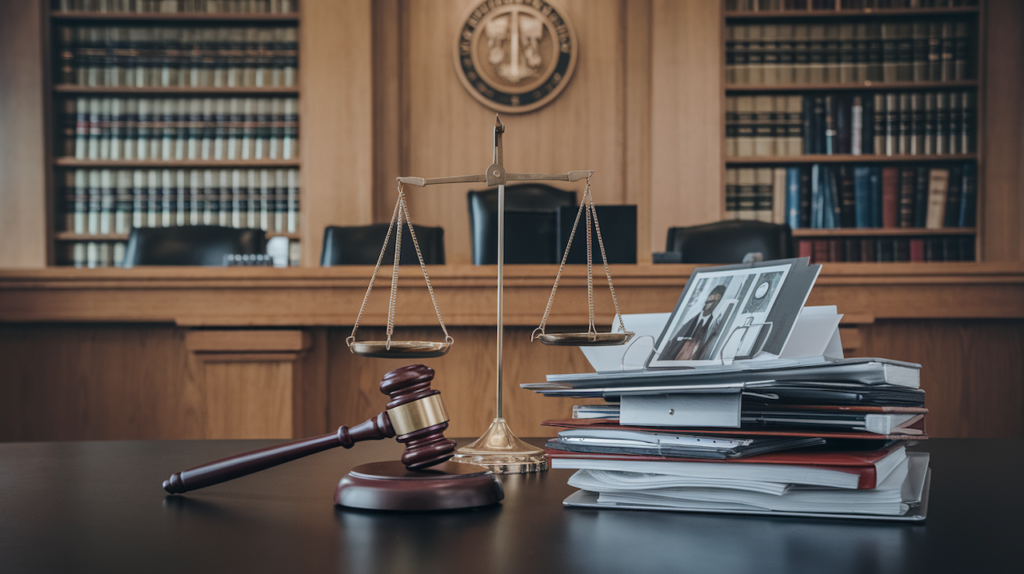What is the Burden of Proof?
A Burden of Proof is the responsibility to demonstrate the accuracy and truthfulness of one’s claim; the party with the burden of proof must provide evidence to support their claim. In legal proceedings, the burden of proof can lie with either the plaintiff or the defendant, depending on the type of case and the specific claims being made.

According to Black’s Law Dictionary, the burden of proof is defined as “A party’s duty to prove a disputed assertion or charge.” This definition underscores the responsibility placed on a party to provide sufficient evidence to convince the judge or jury of the truth of their assertions.
Examples vary depending on the type of case. In civil cases, the burden of proof is typically on the plaintiff, who must prove their case by a “preponderance of the evidence,” meaning that it is more likely than not that their claims are true, while in criminal cases, the burden of proof lies with the prosecution, which must prove the defendant’s guilt “beyond a reasonable doubt.”. Having a clear burden of proof includes ensuring fairness in legal proceedings protecting individuals from unjust accusations, by promoting thorough and diligent presentation of evidence.
More information about Burden of Proof
Can You Sue a Car Manufacturer for a Car Crash?
If you’ve been involved in a car accident caused by a defective vehicle, you may be wondering if you can hold the manufacturer accountable. Product liability laws provide a legal pathway to pursue the compensation you deserve if the accident resulted from a defect in the vehicle’s design or manufacturing or failure to provide adequate warnings.
 These cases can be complex, requiring thorough investigation and evidence to prove the manufacturer’s fault. Whether the defect involves faulty airbags, malfunctioning brakes, or a design flaw, understanding your legal options is essential. Speak with an experienced auto defect attorney at Munley Law to determine if you have a valid claim and explore your right to compensation.
These cases can be complex, requiring thorough investigation and evidence to prove the manufacturer’s fault. Whether the defect involves faulty airbags, malfunctioning brakes, or a design flaw, understanding your legal options is essential. Speak with an experienced auto defect attorney at Munley Law to determine if you have a valid claim and explore your right to compensation.
Product Liability in Automotive Accidents
Manufacturer defects can cause automotive accidents. When that happens, the manufacturer may be held liable. Product liability claims allow individuals to seek compensation for injuries caused by such defects. […]
Read MoreMore information about Burden of Proof
Chances of Winning a Wrongful Death Settlement
The sudden loss of a loved one can be emotionally and financially devastating, making a wrongful death lawsuit a viable option for many families. Understanding the legal process and the factors that can affect the chances of winning is crucial before proceeding with a claim.
Understanding the Chances of Winning a Wrongful Death Settlement
 Many plaintiffs find that, depending on the circumstances of their case, there is a high likelihood that they will reach a settlement. Several factors can influence the chances of success in a wrongful death claim, including the strength of the evidence, the clarity of liability, and the presence of any contributing negligence. Additionally, the experience of your legal representation can significantly impact the outcome. Recent data indicates a more favorable outcomes for plaintiffs in wrongful death lawsuits in Pennsylvania.
Many plaintiffs find that, depending on the circumstances of their case, there is a high likelihood that they will reach a settlement. Several factors can influence the chances of success in a wrongful death claim, including the strength of the evidence, the clarity of liability, and the presence of any contributing negligence. Additionally, the experience of your legal representation can significantly impact the outcome. Recent data indicates a more favorable outcomes for plaintiffs in wrongful death lawsuits in Pennsylvania.
A wrongful death attorney who is well-versed in wrongful death cases can help advocate for your rights, […]
Read MoreMore information about Burden of Proof
What’s the Difference Between Premises Liability and Personal Liability?
If you’ve experienced a loss or injury, it’s important to determine whether the blame falls on an individual’s behavior or a hazardous condition on a property. This is why it’s important to understand the distinction between premises liability and personal liability. Both terms relate to the legal responsibility that may come into play in liability cases when victims seek justice and compensation from an individual or a property owner through a legal claim.
Understanding Premises Liability
For those injured on someone else’s property, understanding premises liability is necessary to explore options for justice. This area of law holds a property owner responsible for maintaining a safe environment for residents, employees, and visitors alike. When a property owner neglects this duty, they may be held liable for any injuries sustained.
Common types of premises liability claims include slip and fall accidents, dog bites, […]
Read MoreMore information about Burden of Proof
Personal Injury Glossary Terms
This glossary provides a quick-access resource for looking up definitions of terms you will likely encounter while seeking compensation.
A | B | C | D | E | F | G | H | I | J | K | L | M | N | O | P | Q | R | S | T | U | V | W
A
Accident Report — A detailed official record of an incident created on-site by an authority figure such as a police officer or hospital staff member.
Act of God — An unforeseen event caused by natural forces without human involvement that couldn’t have been prevented with reasonable care, […]
Read MoreMore information about Burden of Proof
Distracted Driving Accident Lawyer
If you have been in an accident caused by a distracted driver, contact a distracted driver accident lawyer at Munley Law. Distracted driving is dangerous behavior and one of the leading causes of severe and deadly car accidents across the country. Across the United States, legislators have begun acknowledging the dangers of distracted driving.
Distracted driving is nothing new. Since the advent of vehicles, drivers have been distracted by sights and sounds from the outside– billboards, reading bumper stickers, the actions of other drivers and pedestrians, and more. Unfortunately, the problem isn’t going away, and with the introduction of constantly changing technology, it is only getting worse.
Distracted driving is one of the most common reasons for traffic injuries and fatalities. In 2021, 3,522 people (drivers, pedestrians, passengers, and bicyclists) died due to distracted driving accidents, according to the National Highway Traffic Safety Administration (NHTSA). […]
Read More








